 Petzlover
Petzlover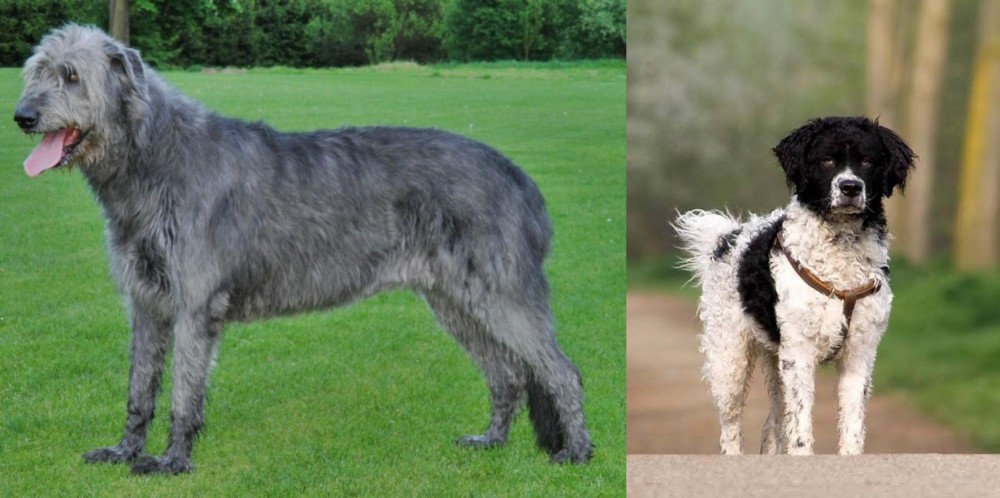 Irish Wolfhound is originated from Ireland but Wetterhoun is originated from Netherlands. Irish Wolfhound may grow 27 cm / 11 inches higher than Wetterhoun. Irish Wolfhound may weigh 19 kg / 42 pounds more than Wetterhoun. Irish Wolfhound may live 4 years less than Wetterhoun. Irish Wolfhound may have less litter size than Wetterhoun. Both Irish Wolfhound and Wetterhoun requires Moderate Maintenance.
Irish Wolfhound is originated from Ireland but Wetterhoun is originated from Netherlands. Irish Wolfhound may grow 27 cm / 11 inches higher than Wetterhoun. Irish Wolfhound may weigh 19 kg / 42 pounds more than Wetterhoun. Irish Wolfhound may live 4 years less than Wetterhoun. Irish Wolfhound may have less litter size than Wetterhoun. Both Irish Wolfhound and Wetterhoun requires Moderate Maintenance.
 It is believed that the Irish Wolfhound is an ancient breed and that it was brought to Ireland as early as 7000 BC.
It is believed that the Irish Wolfhound is an ancient breed and that it was brought to Ireland as early as 7000 BC.
These dogs were bred as hunting dogs as well as guard dogs. There was a time when these huge canines were only allowed to be owned by the nobility. The breed died out somewhat, but Scotsman Captain George Augustus Graham made efforts to restore the breed’s numbers.
Captain Graham devoted his life to making sure the Irish Wolfhound’s numbers were built up, and the breeding program included Great Danes, Borzois, English Mastiffs and Scottish Deerhounds.
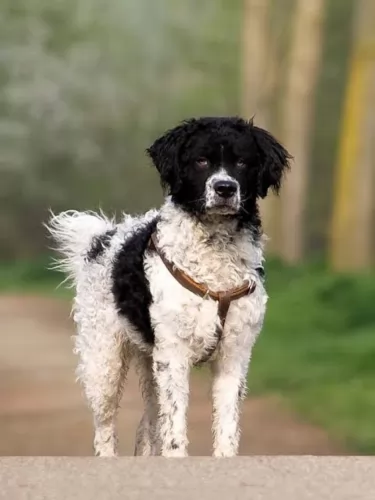 The Wetterhoun is a water dog developed in the 1500 or 1600s to hunt otters. The breed was developed by the Frisians in the Netherlands near the Northwest corner. In addition to catching otters in the lakes near by, they were also used as gundogs to hunt game. They are a fearless, tough and loyal working dog. They love the water and they are build for it with a waterproof coat and tight tail that is spiraled. They will swim happily in freezing cold weather as well.
The Wetterhoun is a water dog developed in the 1500 or 1600s to hunt otters. The breed was developed by the Frisians in the Netherlands near the Northwest corner. In addition to catching otters in the lakes near by, they were also used as gundogs to hunt game. They are a fearless, tough and loyal working dog. They love the water and they are build for it with a waterproof coat and tight tail that is spiraled. They will swim happily in freezing cold weather as well.
The Wetterhoun is rare and not seen outside of the Netherlands. Descendent of the Water Dog, that is now extinct, he is probably a relative of many spaniel types that also call the Water Dog their ancestor. Yet the Wetterhoun is not a spaniel or spaniel type.
The breed almost disappeared during World War II, like many others, they brought back and are now becoming more and more popular. The breed is only recognized by the Federation Cynologique Internationale and the United Kennel Club. AKC does not recognize them, but there are many hunting clubs and other registries that do. They are often promoted as one of the rare breeds.
 The tallest of the sighthounds, the Irish Wolfhound looks like a large Greyhound, only he has a rough, wiry type of coat.
The tallest of the sighthounds, the Irish Wolfhound looks like a large Greyhound, only he has a rough, wiry type of coat.
He is also gracefully built and known as a gentle giant. The double coat which can be fawn, red, white, grey, black or brindle is straight to wavy.
He stands at about 81 to 86cm and weighs roughly 48 to 54kg. This is one of the few dog breeds that you can’t really call social. He loves his own human family, and becomes unhappy and ‘down-in-the-dumps’ when separated from his family members for too long. He is a quiet dog who tends to be somewhat introverted and reserved, while being highly intelligent.
He will require being trained and socialized to make him obedient as he is an independent dog. He takes his role as family protector seriously and even though he is quiet, he is ready to take on anyone who threatens his property.
The Irish Wolfhound is a gentle, quiet, soft-natured, easy-going dog and even though it is such a large dog, it doesn’t throw it’s weight around but is calm and patient around the elderly and children in the home. It can tend to be aggressive with animals he isn’t familiar with.
He is an intelligent dog, but even so he may be quite resistant to training as he is strong-willed and determined to have his own way. These dogs need to be trained and socialized otherwise they just do their own thing.
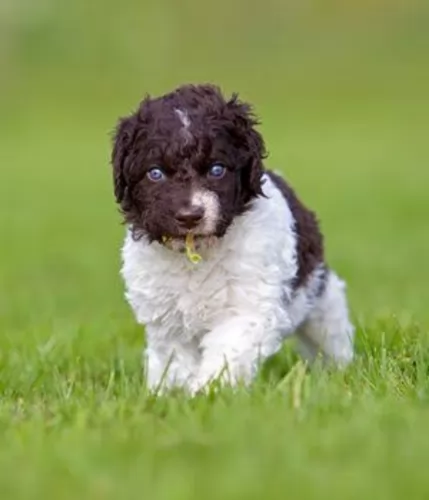 The Wetterhoun is a compact, medium sized breed weighing about 55 to 77 pounds. Great water dogs they are athletically built with low set ears hanging next to their heads, a waterproof coat, distinctive eyes with a very serious expression and a tightly curled tail held aloft over the back. Their coat is waterproof, somewhat oily, curly and thick. The fur is of a smoother texture on the ears, head, and legs. They can be solid black, solid brown, brown with white, or black with white.
The Wetterhoun is a compact, medium sized breed weighing about 55 to 77 pounds. Great water dogs they are athletically built with low set ears hanging next to their heads, a waterproof coat, distinctive eyes with a very serious expression and a tightly curled tail held aloft over the back. Their coat is waterproof, somewhat oily, curly and thick. The fur is of a smoother texture on the ears, head, and legs. They can be solid black, solid brown, brown with white, or black with white.
 The most notable aspect of the Irish Wolfhound is his amazing height. The legs are long, the body narrow. He is gentle and easy-going but because he is a sighthound he loves to give chase after animals.
The most notable aspect of the Irish Wolfhound is his amazing height. The legs are long, the body narrow. He is gentle and easy-going but because he is a sighthound he loves to give chase after animals.
He is capable of living in the city or countryside, but your home will need to cater to his size. He isn’t particularly energetic, enjoying a quiet life but he will absolutely need to be exercised.
Provide your gentle giant with everything needed to make him content, and you’ll have a faithful, loving friend for about 10 years.
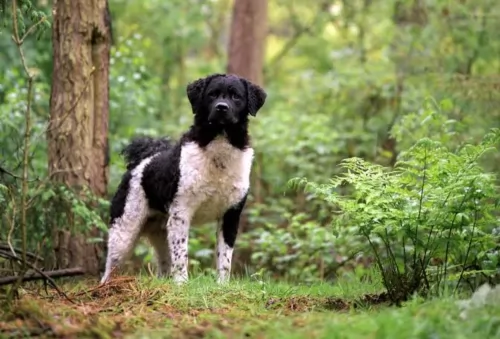 3.Adaptability – not a great apartment dog even though he is not that big. They need space. They need a job and they will finish their job at their own pace no matter what you say. It is impossible to train this trait out of them.
3.Adaptability – not a great apartment dog even though he is not that big. They need space. They need a job and they will finish their job at their own pace no matter what you say. It is impossible to train this trait out of them.
4.Learning ability Very high learning ability, very eager to learn and very smart. He is stubborn about finishing whatever job he is working on
 One wonders why breeders seem so bent on breeding such large dogs when they have health issues and they don't live particularly long. Not only do they cost a fortune to feed, but large dogs like this are more prone to illnesses and won’t live as long as small dog breeds. This big dog can live up to 10 years of age or so.
One wonders why breeders seem so bent on breeding such large dogs when they have health issues and they don't live particularly long. Not only do they cost a fortune to feed, but large dogs like this are more prone to illnesses and won’t live as long as small dog breeds. This big dog can live up to 10 years of age or so.
For starters, just because he is a deep chested dog, bloat or gastric torsion can be a threat. Other illnesses to look out for are dilated cardiomyopathy and bone cancer.
This is a disease of the heart muscle where the enlarged heart won’t function properly. The upper- and lower chambers of the heart are enlarged and the heart isn’t able to pump blood out properly. When the heart’s ventricle doesn’t pump enough blood into the lungs, fluid accumulates in the lungs and this ultimately leads to congestive heart failure.
Older dogs battle more with this heart disease and it is also more common in some dog breeds of which the Irish Wolfhound is one. Your dog will have shortness of breath, coughing and abdominal distension. He will need to get to the vet for medical tests.
Bone cancer can strike any dog, but you’ll find in more commonly with larger dog breeds. It can spread quickly and the long term prognosis isn’t good. It’s not easy to pick the disease up and it can mean joint pain for your pet and even lameness.
Your dog will be tired too. Your vet will do X-rays and other tests, but unfortunately the prognosis isn’t usually good. Big-dog breeders should take this into consideration.
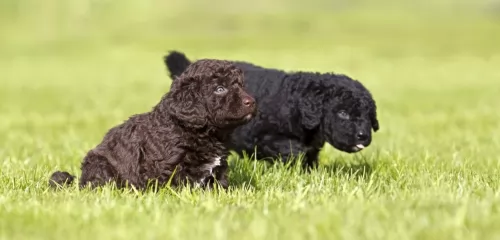 A hardy and healthy breed they do not have severe health issues. But like every his
A hardy and healthy breed they do not have severe health issues. But like every his
• Ear Infections – like any breed with hanging ears they can be prone to infection. This is particularly true because the dogs are in the water a lot. Be sure to clean and dry them after every water episode and inspect them on a regular basis even if the dog has not been in the water.
• Patellar Luxation – Knee cap issue with movement and inflammation. Can cause lameness and arthritis.
 This isn’t a particularly energetic dog and he can tend to become lazy. Don’t allow this as becoming unfit and overweight can be very bad for such large dog. Being so large already puts stress on the dog’s body, and the dog is already susceptible to cardiac and skeletal problems. Allowing him to become lazy and overweight will be a death sentence for this large dog. It is imperative to make sure you take him on walks and play games with him.
This isn’t a particularly energetic dog and he can tend to become lazy. Don’t allow this as becoming unfit and overweight can be very bad for such large dog. Being so large already puts stress on the dog’s body, and the dog is already susceptible to cardiac and skeletal problems. Allowing him to become lazy and overweight will be a death sentence for this large dog. It is imperative to make sure you take him on walks and play games with him.
The coat of your dog is thick and medium length and he will require being brushed at least twice a week. You may want to also trim the longer hair you find around his face and legs.
When it comes to his ears, you can moisten some cotton wool and wipe the inside of his ears to remove dirt and excess wax. Remember not to probe too deeply to avoid damaging the ear. If you’re uncertain how to do this, your vet can explain to you how its done.
Check his teeth regularly as dental disease can affect other areas of the body too. Don’t allow his nails to get too long as they can cause paw problems and the nails can hook onto things and cause injury.
Because this is a giant breed, the puppy will grow for a long time. Speak to your vet about how to ensure you feed your puppy in such a way that he doesn’t grow too quickly.
If you feed your dog a commercially manufactured food, make sure its one of the top quality brands. Include home-made cooked food such as chicken, rice and vegetables into his kibble from time to time, and also try to feed him some raw meat occasionally.
Fresh, cool water must be available to your Irish Wolfhound around the clock.
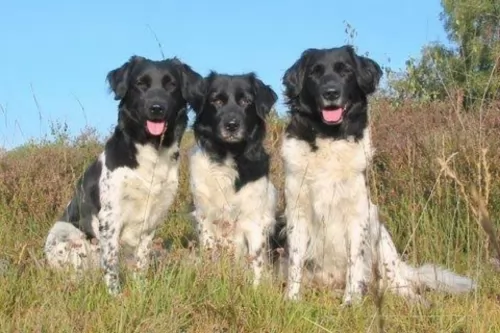 1Feeding the puppy -This is an active, hunting and swimming breed. They need good nutrition and high quality puppy food. A food formulated for active breeds or hunting dogs would be best. Feed your puppy in smaller amounts 3-4 times per day.
1Feeding the puppy -This is an active, hunting and swimming breed. They need good nutrition and high quality puppy food. A food formulated for active breeds or hunting dogs would be best. Feed your puppy in smaller amounts 3-4 times per day.
2.Feeding the adult - This is an active, hunting and swimming breed. They need good nutrition and high quality adult food. A food formulated for active breeds or hunting dogs would be best. Feed your adult twice per day.
4. Games and Exercises – This is an active working dog that needs a lot of exercise every day. A 30 minute walk is only the beginning. They need outdoor time to play and run. They need to swim if at all possible.